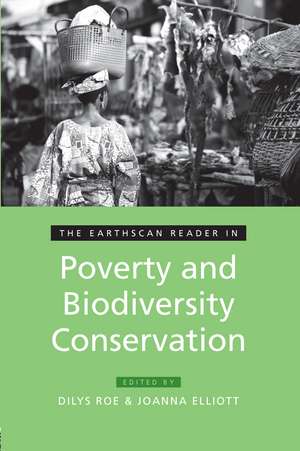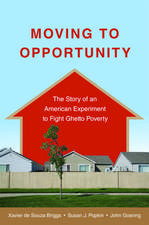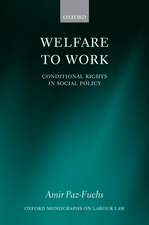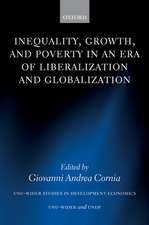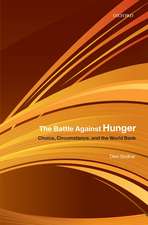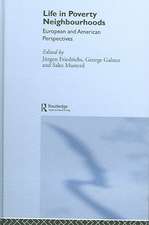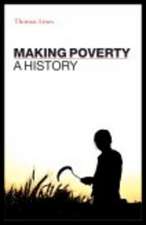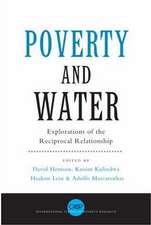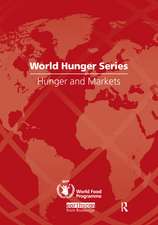The Earthscan Reader in Poverty and Biodiversity Conservation: Earthscan Reader Series
Editat de Dilys Roe, Joanna Elliotten Limba Engleză Paperback – 26 feb 2010
| Toate formatele și edițiile | Preț | Express |
|---|---|---|
| Paperback (1) | 378.39 lei 43-57 zile | |
| Taylor & Francis – 26 feb 2010 | 378.39 lei 43-57 zile | |
| Hardback (1) | 1120.23 lei 43-57 zile | |
| Taylor & Francis – 26 feb 2010 | 1120.23 lei 43-57 zile |
Preț: 378.39 lei
Nou
Puncte Express: 568
Preț estimativ în valută:
72.41€ • 75.79$ • 60.26£
72.41€ • 75.79$ • 60.26£
Carte tipărită la comandă
Livrare economică 31 martie-14 aprilie
Preluare comenzi: 021 569.72.76
Specificații
ISBN-13: 9781844078431
ISBN-10: 1844078434
Pagini: 416
Ilustrații: Figures, tables, graphs, boxes, index
Dimensiuni: 156 x 234 x 33 mm
Greutate: 0.66 kg
Ediția:1
Editura: Taylor & Francis
Colecția Routledge
Seria Earthscan Reader Series
Locul publicării:Oxford, United Kingdom
ISBN-10: 1844078434
Pagini: 416
Ilustrații: Figures, tables, graphs, boxes, index
Dimensiuni: 156 x 234 x 33 mm
Greutate: 0.66 kg
Ediția:1
Editura: Taylor & Francis
Colecția Routledge
Seria Earthscan Reader Series
Locul publicării:Oxford, United Kingdom
Cuprins
1. Biodiversity Conservation and Poverty Reduction:An Introduction to the DebatePart I: Linking Biodiversity Conservation and Poverty Reduction - Where, How and Why?Editors' Introduction2. Biodiversity Conservation and the Eradication of Poverty3.Linking Conservation and Poverty Reduction: Landscapes, People and Power4. Poverty, Development and Biodiversity Conservation: Shooting in the Dark?5. Livelihoods, Forests and Conservation in Developing Countries: An Overview Part II: Conservation's Place in International DevelopmentEditors' Introduction6. Integrating the Rio Conventions into Development Co-operation7. Wildlife and Poverty Study8. Striking a Balance: Ensuring Conservation's Place on the International Biodiversity Assistance Agenda9. Report of the Ad Hoc Open-ended Working Group of Review of Implementation of the Convention10. Contested Relationships between Biodiversity Conservation and Poverty Alleviation11. Poverty and Conservation: The New Century's 'Peasant Question?'12. Making Poverty Reduction Irreversible: Development Implications of the Millennium Ecosystem AssessmentPart III: Conservation Policy and ProtectionismEditors' Introduction13. Protected Areas and Poverty - The Linkages and How to Address Them14. Conservation Policy and Indigenous Peoples 15. The Role of Protected Areas in Conserving Biodiversity and Sustaining Local Livelihoods.16. Eviction for Conservation: A Global Overview17. Political Ecology and the Costs and Benefits of Protected Areas 18. A Property Rights Approach to Understanding Human Displacement from Protected Areas: The Case of Marine Protected AreasPart IV: Conservation NGOs and Poor PeopleEditors' Introduction19. Two Agendas on Amazon Development20. International Conservation Organisations and the Fate of Local Tropical Forest Conservation Initiatives21. A Challenge to Conservationists22. Conservation, Development and Poverty Alleviation: Time for a Change in Attitudes23. Conserving What and for Whom? Why Conservation Should Help Meet Basic Needs in the Tropics24. Disentangling the Links between Conservation and Poverty Reduction in PracticePart V: New Developments: Ecosystem Services, Carbon and Climate ChangeEditors' Introduction25. Ecosystems and Human Well-being: Current State and Trends26. Selling Out on Nature (and letters in response)27. Payments for Environmental Services and the Poor: Concepts and Preliminary Evidence28. Climate, Carbon, Conservation and Communities29. Protecting the Future: Carbon, Forests, Protected Areas and Local Livelihoods 30. Seeing REDD? Forests, Climate Change Mitigation the Rights of Indigenous Peoples and Local Communities Part VI: Moving Beyond the Debate - The Need for Conservation-poverty PartnershipsEditors' Introduction31. Partnerships for Conservation and Poverty Reduction32. Common Ground between Anthropology and Conservation Biology 33. Thinking Like a Human: Social Science and the Two Cultures Problem
Notă biografică
Dilys Roe is a Senior Researcher in the Natural Resources Group at the International Institute for Environment and Development (IIED), London, UK. Joanna Elliott is Vice President for Program Design and Knowledge Management at the African Wildlife Foundation.
Recenzii
'We are at the threshold of an exciting but fraught new paradigm that compels conservation NGOs to shift from the notion that nature must be protected from people, to embracing the realization that natural systems must be conserved for people. This timely and important book is a must read for all who are ready to explore and examine the challenging new frontier that links conservation with human well-being.' – Steve McCormick, Gordon and Betty Moore Foundation, USA
'Biodiversity provides essential goods and services that people everywhere - above all poor people -- depend on. And it helps people cope with change and manage risk. Yet too often development erodes biodiversity, and too often conservation has been promoted without engaging poor people and without caring for their needs and rights. This book provides a valuable toolkit that will assist all those seeking to eradicate poverty, conserve biodiversity, and manage the trade-offs between these fundamental goals.' – David Cooper, Secretariat, Convention on Biological Diversity
'This book provides a stark reminder that one group's biosphere is another group's backyard. The rich biodiversity of our forests, coasts, and grasslands stands in contrast with the poverty of the people living there. The plants, people, and animals in these landscapes are inextricably connected. In this outstanding reader leading experts describe and debate those connections. No easy answers here, but who said life was simple. This is definitely worth the read.' – David Kaimowitz, Ford Foundation
'The collection of writings thoroughly explains the complex relationships between conservation and poverty reduction. It is possible to imagine motivated and careful readers to become well enough informed after finishing this book to work in the field or want to.' – Crosslands: Bulletin on Business, Law and the Environment
'The editors have drawn together a galaxy of authors who bring expertise on all aspects of biodiversity loss, conservation, poverty and its alleviation. In fact the book may be regarded as a manual on these two subjects with a wealth of references, experiences and perspectives.' – Professor John Hodges, AGRI
'The breadth of material will help readers, including students and professionals, to locate current debates within their wider contexts.' – Abstracts of Public Administration, Development, and Environment.
"The editors (Dilys Roe and Joanna Elliot) have carefully structured the Reader to cover a range of important issues and provide a clear and helpful commentary on the individual articles ... Many of the articles are thought provoking and likely to stimulate renewed discussion on the difficult questions that confront those interested in the topic" – Toby Hodgkin, Experimental Agriculture
'Biodiversity provides essential goods and services that people everywhere - above all poor people -- depend on. And it helps people cope with change and manage risk. Yet too often development erodes biodiversity, and too often conservation has been promoted without engaging poor people and without caring for their needs and rights. This book provides a valuable toolkit that will assist all those seeking to eradicate poverty, conserve biodiversity, and manage the trade-offs between these fundamental goals.' – David Cooper, Secretariat, Convention on Biological Diversity
'This book provides a stark reminder that one group's biosphere is another group's backyard. The rich biodiversity of our forests, coasts, and grasslands stands in contrast with the poverty of the people living there. The plants, people, and animals in these landscapes are inextricably connected. In this outstanding reader leading experts describe and debate those connections. No easy answers here, but who said life was simple. This is definitely worth the read.' – David Kaimowitz, Ford Foundation
'The collection of writings thoroughly explains the complex relationships between conservation and poverty reduction. It is possible to imagine motivated and careful readers to become well enough informed after finishing this book to work in the field or want to.' – Crosslands: Bulletin on Business, Law and the Environment
'The editors have drawn together a galaxy of authors who bring expertise on all aspects of biodiversity loss, conservation, poverty and its alleviation. In fact the book may be regarded as a manual on these two subjects with a wealth of references, experiences and perspectives.' – Professor John Hodges, AGRI
'The breadth of material will help readers, including students and professionals, to locate current debates within their wider contexts.' – Abstracts of Public Administration, Development, and Environment.
"The editors (Dilys Roe and Joanna Elliot) have carefully structured the Reader to cover a range of important issues and provide a clear and helpful commentary on the individual articles ... Many of the articles are thought provoking and likely to stimulate renewed discussion on the difficult questions that confront those interested in the topic" – Toby Hodgkin, Experimental Agriculture
